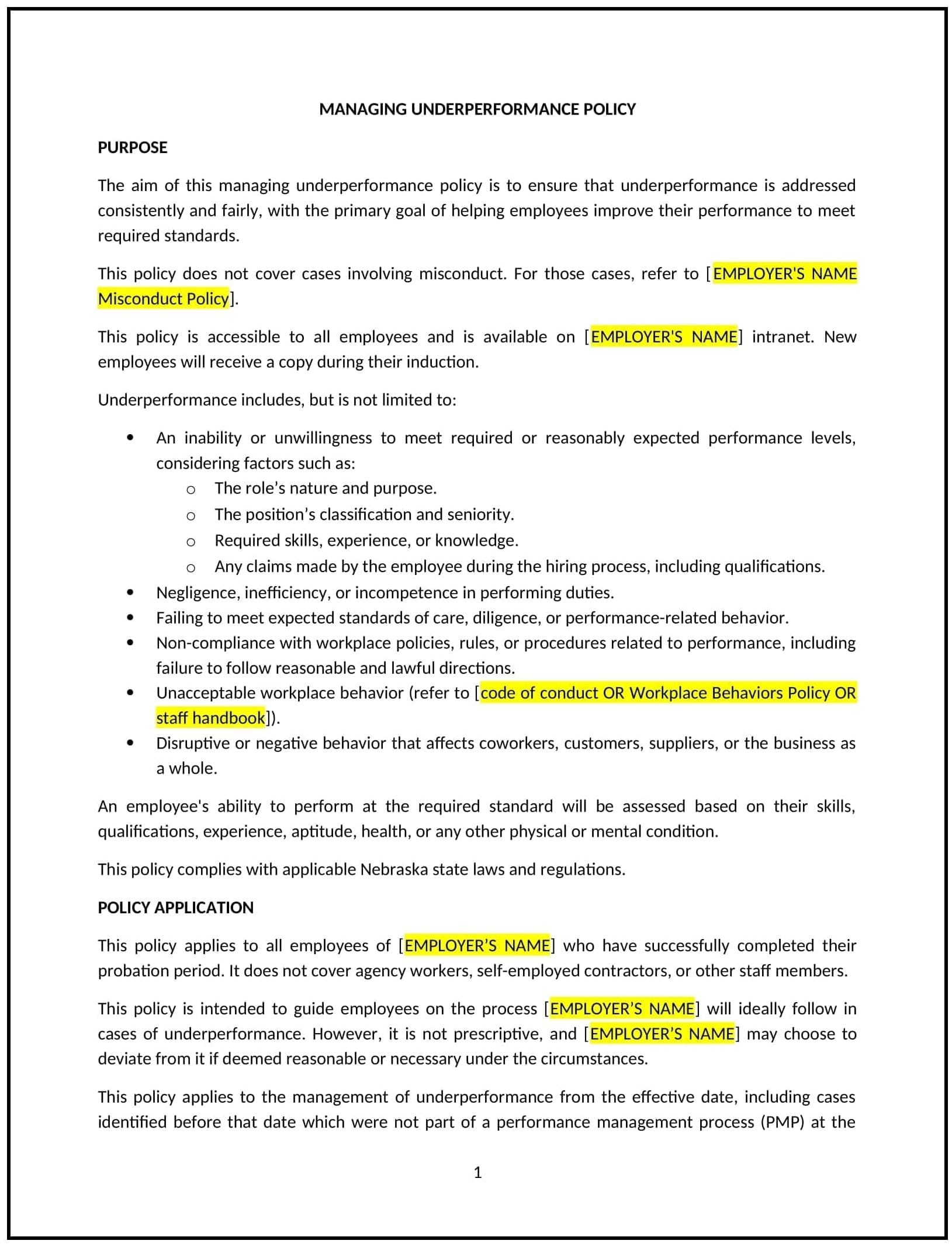Managing underperformance policy (Nebraska): Free template
Got contracts to review? While you're here for policies, let Cobrief make contract review effortless—start your free review now.

Customize this template for free
Managing underperformance policy (Nebraska)
A managing underperformance policy helps Nebraska businesses address employee performance issues by establishing clear procedures for identifying, managing, and improving underperformance. This policy outlines how employees who are not meeting performance expectations will be supported, including setting clear performance goals, providing feedback, offering coaching or training, and taking corrective actions when necessary. It is designed to help businesses foster a high-performance culture while giving employees the opportunity to improve their performance before more formal disciplinary actions are taken.
By adopting this policy, businesses in Nebraska can address underperformance effectively, ensure fairness in managing employee performance, and support employee development.
How to use this managing underperformance policy (Nebraska)
- Define underperformance: Clearly define what constitutes underperformance, such as failing to meet specific performance standards, productivity targets, or job-related expectations. The policy should specify performance criteria for each role.
- Outline performance expectations: Set clear, measurable goals and expectations for employees, ensuring they understand what is required of them in their roles. Performance standards should be realistic, achievable, and aligned with business objectives.
- Provide regular feedback: Encourage managers to provide constructive feedback regularly, rather than waiting for annual performance reviews. Ongoing communication helps employees understand their strengths, areas for improvement, and how they can improve their performance.
- Offer support and development: Specify the resources and support available to employees to help them improve their performance, including training, mentoring, or additional coaching. The policy should make it clear that the company is invested in helping employees succeed.
- Implement performance improvement plans (PIPs): For employees whose performance continues to fall below expectations, the policy should outline the process for implementing a performance improvement plan (PIP). This plan should include clear objectives, timelines for improvement, and specific actions to help the employee meet performance standards.
- Address corrective action: If an employee does not show improvement after reasonable support and feedback, the policy should specify the steps for corrective action, which may include formal warnings, suspension, or other disciplinary measures. The policy should clearly state the consequences for failure to improve.
- Establish a clear review process: Clearly outline the process for reviewing performance at regular intervals to assess progress and determine whether the employee has met the goals set in the performance improvement plan. This should involve clear communication and feedback from managers.
- Encourage open communication: Encourage open, two-way communication between employees and managers regarding performance concerns. Employees should feel comfortable discussing challenges or obstacles they are facing that might impact their performance.
- Review and update: Regularly review and update the policy to ensure it reflects the evolving needs of the business, changes in role expectations, or updates to Nebraska state laws regarding employee performance and rights.
Benefits of using this managing underperformance policy (Nebraska)
This policy provides several benefits for Nebraska businesses:
- Improves employee performance: By addressing underperformance early and providing the necessary support, businesses can help employees improve their performance and meet expectations.
- Fosters a high-performance culture: Clear expectations, regular feedback, and support for development encourage employees to take responsibility for their performance and contribute to a positive and productive work environment.
- Reduces turnover: Addressing underperformance proactively helps employees feel supported and gives them the opportunity to improve, which can reduce turnover by avoiding frustration or disengagement.
- Ensures fairness: A structured approach to managing underperformance ensures consistency and fairness in how employees are treated, helping to reduce the risk of discrimination or bias.
- Protects the business: By following a formal, documented process for managing underperformance, businesses can reduce legal risks related to employee performance issues and ensure that decisions are made transparently and in accordance with company policies.
Tips for using this managing underperformance policy (Nebraska)
- Communicate expectations clearly: Ensure all employees understand the performance standards for their roles and how their performance will be evaluated. This can be achieved through regular check-ins, performance reviews, and clearly defined job descriptions.
- Provide training for managers: Equip managers with the skills and tools to manage underperformance effectively, including how to provide constructive feedback, offer support, and implement performance improvement plans.
- Be proactive: Address performance issues early, before they escalate. Provide feedback and support as soon as you notice a decline in performance, rather than waiting for formal reviews.
- Maintain detailed records: Keep thorough documentation of performance discussions, performance improvement plans, and any corrective actions taken. This will help ensure transparency and consistency, and provide legal protection if needed.
- Be flexible and supportive: Understand that external factors may be affecting an employee’s performance, and be willing to offer flexibility or assistance where appropriate. Consider whether additional training, changes to the work environment, or other support could help the employee improve.
- Review and update regularly: Regularly assess the effectiveness of the policy in managing underperformance and make any necessary adjustments. This ensures that the policy remains relevant and aligned with both business goals and employee needs.